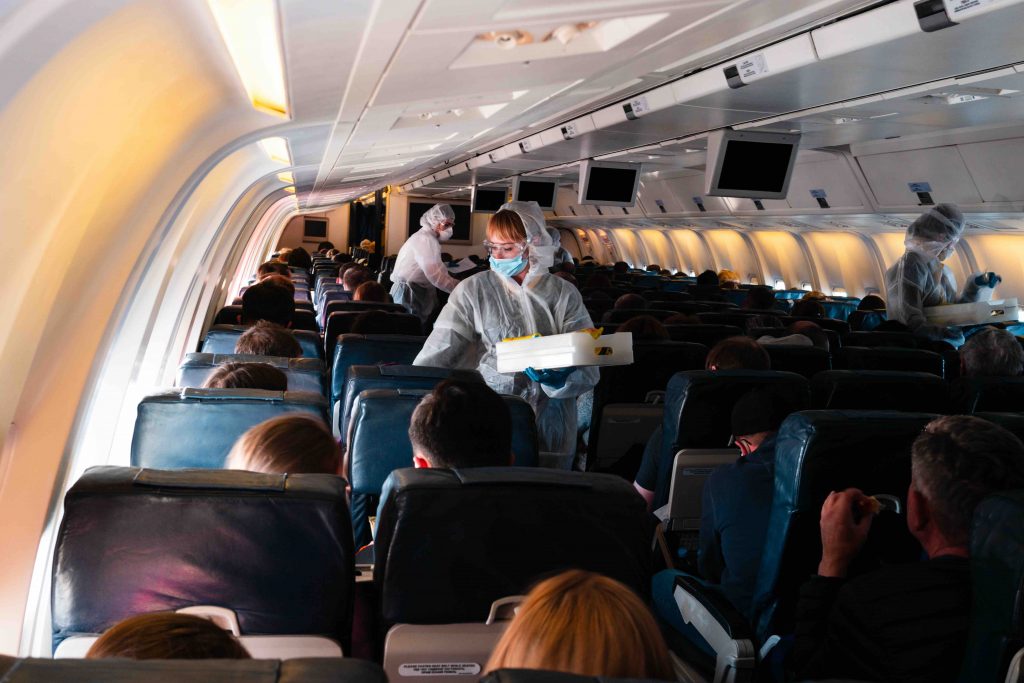Americans are becoming more apt to travel by plane as new and better protocols addressing safety in the prevention of coronavirus transmission are put into place. Airports, airline personnel, and TSA agents are handling a huge increase in the number of airline passengers, according to the Transportation Safety Administration (TSA). Numbers have risen from 80,000 passengers a day in mid-April to nearly 755,000 on July 12 though this is still substantially below the 2.6 million in the previous year. While some airlines are still limiting the number of travelers per flight to maintain social distancing, others like United Airlines and American Airlines have recently lifted their passenger capacity constraints.
What is Required on a Airplane During COVID-19
While some capacity constraints are being eased, the requirement to wear proper face masks upon entering the airport terminal and wearing them throughout the boarding process, flight, and baggage claim except in the case of eating or drinking, is still strictly enforced. Passengers refusing to wear a face mask or covering will not be permitted to fly on most airlines, including Southwest, American, and United. Face mask requirements extend to service counters, gates, Admiral Club, and other first-class lounges. Refusal to comply can see you banned from future flights on United Airlines.
When presenting ID and boarding passes to service counters and TSA agents, most travelers will hold and show their ID and scan their boarding pass. The same holds when boarding the aircraft; passengers will scan their boarding passes to minimize person to person contact. Boarding is now in single file lines and usually ten passengers at a time. Many airlines like Alaska, Allegiant, Delta, Frontier, and JetBlue are boarding planes from the rear rows of the aircraft forward to prevent aisle crowding.
Frontier is the first US airline to use a touchless thermometer to take passenger temperatures and refuse flight service to anyone with a temperature of 100.4 or higher. Nearly all airlines are asking passengers to fill out an online health acknowledgment before check-in. They also require that passengers wash or sanitize their hands before boarding, check their temperatures before heading to the airport, and report they have no symptoms of or exposure to COVID-19 in the previous two weeks.
Seating, Cleaning, & Refreshments for Airline Cabins
Until recently, most middle seats onboard the aircraft have remained empty while some carriers state they are capping seating capacity to 50 percent in first class and 60 percent in the main cabin. However, as air travel becomes more in demand, look for these restrictions to ease. Some airlines like Allegiant will notify passengers if their flight exceeds 65 percent capacity and permit a credit voucher-request or the selection of another flight. However, flight cost differences are the responsibility of the passenger.
Due to the coronavirus, all air carriers are implementing enhanced aircraft cleaning protocols. Hospital-grade disinfectants are the norm, and Southwest Airlines planes are receiving deep cleaning for the nose to the tail for six to seven hours each night. Some airlines like Alaska are providing sanitizing wipes when passengers board, however, look for increasing touchless interactions in flight. For example, there are no more in-flight magazines in the seat-back pocket; however, some airlines like Alaska, have moved the content to its app. Seat-back screens have also been removed from nearly all airlines, and video entertainment is now available on airline apps for viewing in-flight content on your digital device.
For the most part, foodservice is suspended though limited beverages and snacks are available in sealed containers on longer flights. If you want viable food during your plane flight, make a sandwich at home or purchase one en route to the airport. You can still buy snacks, chips, candies, and bottled water at airport terminal shops, but be advised the bars and restaurants are shuttered. Eating and drinking is the only time it is permissible to remove your mask.
While air travel experience is vastly different from 2019, you can still get to your destination if you abide by the airport terminal, TSA, and airline carrier rules and regulations. Be advised of your destination’s quarantine requirements or proof of COVID-19 free test results before embarking on your flight. Find out as much as you can about your airline carrier’s rules and restrictions on their website to ensure your trip will be as pleasant as possible during the coronavirus pandemic.
We hope you found this article helpful. If you have questions or would like to discuss a personal legal matter, please don’t hesitate to reach out. Please contact our Albuquerque office at (505) 830-0202 to discuss how we can help you.

